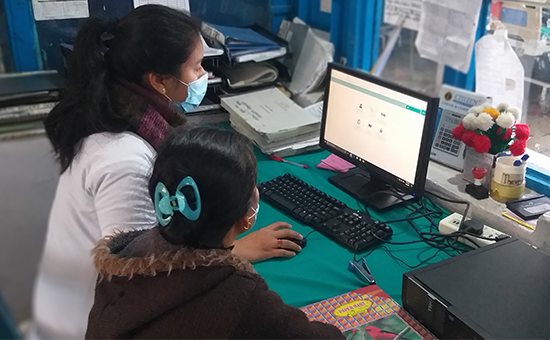
25 Feb Where Are They Now? HRH2030 Health Workforce Resilience Prize 2020 Winner Nyaya Health Nepal
 On June 24, 2020, HRH2030 awarded a $25,000 Health Workforce Resilience Prize to Nyaya Health Nepal, the conclusion of a global competition to recognize successful solutions that strengthen the resilience of the human resources for health workforce. Nyaya Health Nepal’s winning innovation is its integrated Nepal Electronic Health Record (NepalEHR) system, which uses technology and data to coordinate patient care and enables continuous improvement in service delivery. Eight months on from the prize ceremony, we checked in with SP Kalaunee, Nyaya Health Nepal’s Executive Director, to see how the prize has made a difference.
On June 24, 2020, HRH2030 awarded a $25,000 Health Workforce Resilience Prize to Nyaya Health Nepal, the conclusion of a global competition to recognize successful solutions that strengthen the resilience of the human resources for health workforce. Nyaya Health Nepal’s winning innovation is its integrated Nepal Electronic Health Record (NepalEHR) system, which uses technology and data to coordinate patient care and enables continuous improvement in service delivery. Eight months on from the prize ceremony, we checked in with SP Kalaunee, Nyaya Health Nepal’s Executive Director, to see how the prize has made a difference.
HRH2030: Let’s start at the beginning of our collaboration, when Nyaya Health Nepal was awarded the Health Workforce Resilience Prize. What was the immediate impact of this recognition for your organization?
SP Kalaunee: The award was significant in three important ways for Nyaya Health Nepal. First, it was a huge morale boost for the Nyaya Health Nepal team. Since we started developing this open-source-platform based system in 2015 to digitize and strengthen the healthcare system in Nepal, we had invested a significant amount of time and other resources. The award was an encouraging international recognition of the hard work put into it. The timing of the award has its own significance. It was announced during the time when the world was facing the global pandemic—when the team was struggling to respond to the crisis. Second, it motivated us further to scale the system. Prior to the award, we had tested and implemented NepalEHR in a few hospitals, and we were looking to scale it in other facilities. The award encouraged us to expedite our scale up plan in a new province, Karnali, which we will be starting soon. Third, the award strengthened our belief that we can strengthen the healthcare system in Nepal. The award helped enhance the reputation of the organization and motivated us to continue our efforts in building systems and strengthening healthcare in resource-constrained areas.
HRH2030: You have been using the funding to further scale your winning innovation, Nyaya Health Nepal’s integrated Electronic Health Record (NepalEHR). Tell us a little bit about where you are now in this process.
SP Kalaunee: Yes, we have been using the funding from HRH2030 to scale NepalEHR. We have completed rollout in Amppipal Hospital Gorkha recently. The integrated digital system includes modules for different departments, such as clinical, lab, inventory management, radiography, bed management, cash and insurance claims. The users at the hospital have been trained alongside the rollout. Our digital team also provided an additional one-week-long training for specific departments and have continued being the resource for any technical glitches. The hospital staff have started fully using the system, which helps them to manage their time more efficiently, and that has already resulted in shorter waiting time for the patients.
HRH2030: What’s next?
SP Kalaunee: We will continue scaling NepalEHR. Soon, the system will be implemented in another provincial hospital. We have also been asked by a provincial government to utilize the system in all of their hospitals. We are planning to start scaling there also soon.
HRH2030: Have there been any unexpected benefits as a result of winning this award?
SP Kalaunee: Winning the award has made it much easier to communicate about the system with the stakeholders in private and public spheres. As Nepal has struggled and evolved through an internal conflict, a devastating earthquake, and a political transition, there are aspirations of building resilient systems, and this award has proven that human workforce resilience can be built through digital technology. This is a boost to Nepal government’s vision of Digital Nepal.
HRH2030: This prize was awarded in recognition of how NepalEHR helps to foster health worker resiliency. Have you learned anything new or do you have any new insights into the topic of resiliency (health worker or health system resiliency) since winning this award?
SP Kalaunee: We’d like to highlight two important learnings here: One, technology can build resilience during a humanitarian crisis, such as the global pandemic we continue to face. Our team was able to create a COVID-19 dashboard quickly to support care delivery by the frontline health workers and was also able to make the data available to the local and federal government for the required rapid response. Second, adoption of innovation is important for building and sustaining a resilient system. We have been able to hand over the healthcare system we built through our ‘public-private partnership’ with the Ministry of Health and Population to the local government. This has ensured continued integration of NepalEHR in the public system and enabled us to scale innovation in a wider scope.
Photo: At Amppipal Hospital, nursing staff are online with NepalEHR, using the system’s bed management feature. Photo courtesy of Nyaya Health Nepal.





